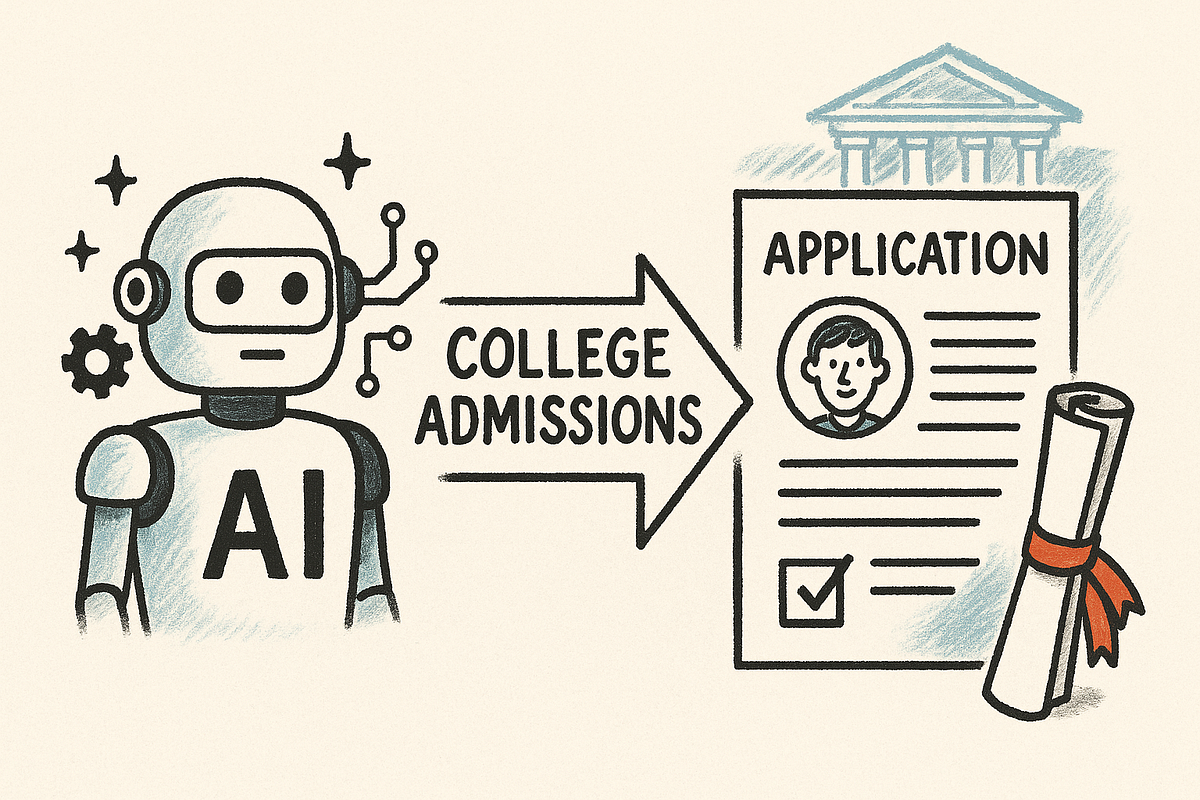AI and College Admissions: A New Era of Opportunity and Challenge
--
College admissions is no longer what it used to be. Somewhere between the GPA, the essay, and the endless extracurriculars, the process of seeing the student as a whole person often falls through the cracks. Enter AI. Not as a buzzword. Not as science fiction. But as an actual, functional part of how applications are being reviewed.
AI in Admissions: From Theory to Reality
According to a September 2023 survey by Intelligent, 50% of U.S. college admissions offices are now using AI in some form during the application review process. That number is expected to reach over 80% by the end of 2024, based on insights from nearly 400 educators across the country. Even more striking: 87% of those schools said AI “sometimes” or “always” contributes to the final admission decision. That’s not just “screening essays.” That’s influencing outcomes.
How AI Is Actually Used (and Where It’s Growing Fast)
Behind the scenes, here’s where AI has quietly taken over:
- Application Screening: AI systems quickly analyze transcripts, test scores, and even extracurriculars, ranking applicants based on rules or thresholds (like auto-rejecting any GPA below 3.5 at some schools).
- Essay Analysis: Algorithms assess essay structure, tone, and originality, and flag anything that feels overly generic, incoherent, or plagiarized.
- Letter of Recommendation Review: Over 70% of AI-using schools now automate this step, saving hours of manual reading.
- Chatbots & Interview Assistants: logging responses, flagging key answers, and transcribing conversations.
- Data Sorting at Scale: At high-volume schools like Rutgers–New Brunswick, AI calculates GPAs, weights AP/IB courses, and filters thousands of self-reported records to reduce human workload and paperwork. At large universities that receive tens of thousands of applications each year, AI isn’t some flashy gimmick. It’s a survival tool.
Does This Mean a Machine Decides Who Gets In?
Short answer:Not exactly — but it decides who even gets read. AI plays a pre-screening role in most competitive colleges. It might flag an application for deeper human review or quietly move others to the “no” pile based on minimum requirements. At highly selective universities (acceptance rates <10%), AI doesn’t make final calls. But it helps reduce time spent on applications that clearly don’t meet baseline thresholds, allowing human officers to focus on nuanced essays, recommendations, and personal context. Rick Clark, Director of Admissions at Georgia Tech, put it well: “When people hear ‘AI,’ they panic. They imagine machines deciding who gets into Yale. That’s not the reality. Humans are still at the center.”
Can AI Make Admissions More Fair?
One of AI’s biggest promises is bias reduction. Theoretically, AI can screen applicants based on performance data, not on names, zip codes, or subconscious impressions. In the Intelligent survey, 56% of schools already using AI, and 38% planning to, said it could reduce human error and subjectivity. But here’s the thing: AI is only as fair as its data and design. If trained on biased historical data, or fed flawed application rules, it can replicate and even amplify existing inequities. As Diane Gayeski, an expert in higher education, puts it: “AI can support objectivity but only when institutions are transparent about their selection criteria.” And let’s be honest: most institutions still haven’t fully clarified their selection criteria, making it hard to tell whether AI decisions are replicable, explainable, or just… convenient.
The Student Side of AI: Help or Hindrance?
Students are increasingly turning to AI-powered tools like ChatGPT to help brainstorm, structure, and revise their college essays. Used thoughtfully, it can be empowering, especially for students who lack access to mentors or writing coaches. But there’s a delicate balance. Many admissions officers are now trained to spot “AI-speak” essays that sound too clean , too abstract , or too impersonal. And they don’t reward it. The message to students is clear: Use AI to support your voice, not to erase it. Authenticity still matters more than polish.
What the Future Looks Like
Over the next decade, AI in admissions will likely:
- Expand into real-time data sharing between high schools and universities
- Tailor application evaluations based on intended major (e.g., more weight on math scores for engineering applicants)
- Automate more “document processing” to reduce admin burden for both schools and students
- Raise the standard for transparency and accountability in admissions decisions But even as these systems evolve, the need for human judgment and human connection remains. Because behind every transcript is a teenager. Behind every essay, a life. And behind every application, a dream.
Final Thoughts: AI Is a mirror, Not a Replacement
AI doesn’t replace admissions officers. AI is a mirror. It reflects what we value in admissions: speed, structure — but also risk, bias, and blindness if left unchecked. It’s on all of us educators, parents, students — to use that power wisely. To demand transparency. To preserve empathy. To keep asking not just how fast we can process an application but how deeply we can still understand the person inside it. Because admissions isn’t just about selecting a class. It’s about recognizing potential and doing it in a way that reflects the values we want those future students to carry with them. As someone who works closely with students, I believe AI can absolutely be a tool for admissions officers, counselors, and applicants themselves. I’ve seen how it can help kids build better essays, organize their stories, and reflect on what truly matters. But I’ve also seen what happens when students rely too much on AI, tries to sound “AI-perfect”, stripped of their quirks, emotions, and personal voice. Those essays? Forgettable. In the end, AI might help get your story read, but it’s your humanity that gets remembered.
